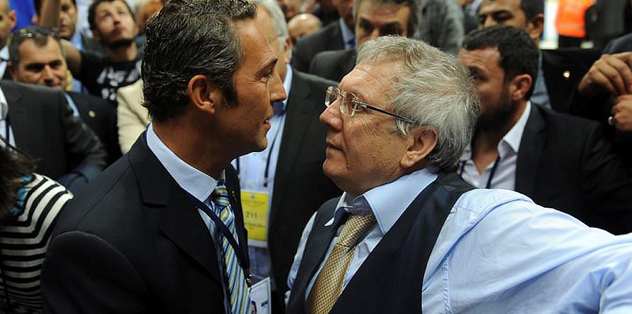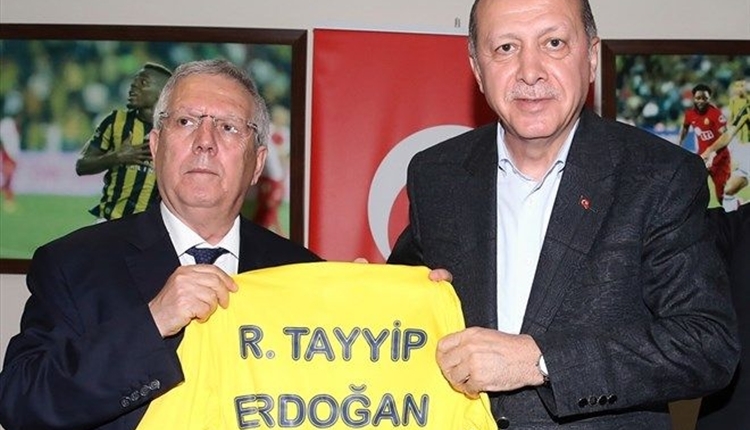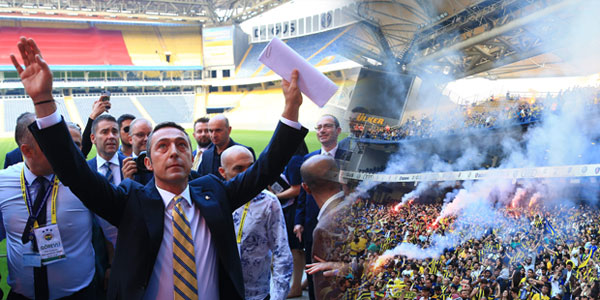Wind of Change in Air After Revolution in Fenerbahce Republic
In normal time, a leadership change at a football club in Turkey would never garner as much national attention as it commands now. After all, delegates of a club only elect a new chairman. But these are not normal times and the club we talk about is not an ordinary soccer institution, it is Fenerbahce, or, in the words of its die-hard fans, The Republic of Fenerbahce, one of the three powerhouses of Turkey’s ever-growing football industry.
Fenerbahce, after Galatasaray, has the largest fan base and a strong financial state. Its impact on the Turkish football economy is undeniable. When, in 2006, the leading technology firm Vestel increased its sponsorship to Manisaspor in a bid to break the monopoly of Istanbul clubs over Turkish football by bringing the trophy to the Aegean side, it saw its market share and sales in sharp decline due to an undeclared boycott from Fenerbahce fans. It especially became clear when Vestel Manisasport beat Fenerbahce 5-3 toward the end of 2005-2006 season, denting the Istanbul side’s prospect for the league title, its sales saw 20 percent drop at a short period of time.
After years of generous backing of Manisaspor, the struggling Vestel finally was forced to give up its sponsorship to preserve its place in the technology market.
That Fenerbahce went through an election on Sunday. The landslide victory of Ali Koc against Aziz Yildirim whose 20-year reign left an indelible mark in the club has had rippling echo across the society and politics.
The first temptation for the observers of the club congress and its dramatic result was to draw a parallel for the upcoming elections, comparing two figures, a young, aspirant board member Ali Koc and the veteran, established figure Yildrim with politicians running in the presidential contest.
The comparison was unmistakable and anyone who penned down a commentary in social media invoked the similarities of normally two different elections, and two personalities at a soccer club and presidential candidates of the election.

Sunday was the culmination of weeks of campaigning on both sides to shape the future of Fenerbahce. Koc, a young member of Turkey’s wealthiest family, vowed to reinvigorate a dull atmosphere in the club, pledging to bring reforms and change. While Yildirim is mostly associated with establishment and status quo, Koc represents a face of new generation of reformists.
Muharrem Ince, the presidential candidate of the main opposition Republican People’s Party (CHP), was aware of the parallelism drawn by the public when he answered a question in a televised interview on Monday night.
“I called Mr. Ali Koc and celebrated him. Sometimes that happens. It does not matter whether you are successful or unsuccessful, you cannot stand before the wind of change when it arrives,” he said, expressing no need for subtle word games when he revealed his intention for a similar outcome in June 24 elections.
The theme he chose was “the wind of change” and it has been in the air in Turkey after 16-year rule of President Recep Tayyip Erdogan and his government.
“Leaders are the ones who lead a change; those who follow it in the middle only conceive the situation and those who stand against it are destroyed,” Ince told a journalist on Star TV.
Another opposition candidate, Islamist Felicity Party leader Temel Karamollaoglu expressed surprise by the outcome. He wrote on Twitter that nobody could have predicted that the long-time Fenerbahce chairman would be toppled by a deep wave.
“In my opinion, the same will happen at the elections,” he said, according to Bloomberg.
Atilla Tas, a social media phenomenon who spent more than 18 months in jail over his opposition to President Erdogan during the post-coup crackdown, posted a much-shared tweet on Twitter. The message was crystal clear.
On the left side was CHP candidate Ince and on the right was Ali Koc. “Tamam (Ok) Friends, slowly slowly! Everything is step by step!” he wrote.
Tamam arkadaşlar yavaş yavaş! Her şey sırayla! ✌️ pic.twitter.com/Aas2oxQaEn
— Atilla Taş (@AtillaTasNet) June 3, 2018
Soccer and Politics, a Chairman and a President
The downfall of Yildirim in Fenerbahce is no an ordinary event. It is a story about new versus old, it is about insurgent versus establishment figure and it is about status quo and change. The pair of comparisons offer a set of lessons for Turkey’s disgruntled opposition who saw a source of inspiration in the defeat of Aziz Yildirim, the most controversial figure in the Turkish football landscape.

He is universally hated not only by rival team fans but also at home, in his own club. He and President Erdogan have more in common than meets the eye at first glance. They both share strongman mindset. Both figures established a one-man rule on their respective perches, in the club and in the country.
Neither Yildirim nor Erdogan brook any dissent. They have no qualms over engaging in most bizarre and scandal-riven engagement with the media. They have their epic comebacks. Yildirim survived a match-fixing scandal that swept the entire Turkish football, tainted Fenerbahce’s hard-won championship title in 2011. The 2011 controversy cost the club’s participation to the European competition for several years.
Despite their disdain for Yildirim, fans and club members coalesced around him during those tumultuous days. Yildirim remained in police custody for nearly a year over the charges of match-rigging.
He stoutly fought back and clung to his post for seven more years.
Fenerbahçeliler yeni güne umutla başlıyor, sıra Türkiye’de
Ali Koç, çünkü Türkiye ve Fenerbahçe için değişim zamanı | Ergun Babahan | @ebabahan https://t.co/tEkjeu1w3T
— ergunbabahan (@ebabahan) June 4, 2018
“Fenerbahce fans are waking up to a new day with hope, now it is Turkey’s turn,” Ergun Babahan, a Turkish journalist and die-hard fan of Fenerbahce wrote in Ahval.
In his commentary, he offered an autopsy report about Yildirim era, which saw Fenerbahce lagged behind its arch-rival Galatasaray. Yildirim, Babahan noted, is not only the chairman who served the longest period but also the one who saw most championships by Galatasaray.
The Yellow Canaries clinched the league championships six times while Galatasaray finished the season at the top spot, winning 10 domestic titles.
Similar to Erdogan’s economic success, Yildirim proved to be a deft businessman enlarging the budget of Fenerbahce, building a new stadium with entire club resources, building a new sports hall, expanding the club’s presence in other athletic sports.
Yildirim, Babahan underlined, plunged Fenerbahce into a debt cycle, overstretched the club’s financial resources. According to a data compiled by Bloomberg, the club now has more than $200 million debt. Koc’s candidacy, therefore, was embraced by board members and delegates with great enthusiasm given the Koc business group’s economic prowess.
As Babahan argued, Yildirim did not give up his hold on power on time, he resisted against calls for quit. The fans and the club long ago needed a fresh face, a new voice for enacting change in the club. Like Erdogan, Yildirim’s omnipresence was visible in every part of the club. He claimed to be a football genius and even blatantly interfered in coach’s team selections.
He often appealed to an us-and-them rhetoric, lamenting about “endless plots” against him and the club. And then change came.
In his victory speech at Fenerbahce Sukru Saracoglu Stadium, Koc said the country was fed up with rabble-rousing and polarizing, violent language, pledging to stick with a civic discourse and respect for others.




Comments are closed.